On a recent trip, I was stuck with a long layover at Newark International Airport. My flight to Newark arrived a little before 10:00 AM with my outbound to Europe not scheduled to depart until around 6:00 PM. Though there has been some progress on terminal upgrades, Newark is still one of my least favorite airports at which to spend any prolonged amount of time.
While en route to Newark, I opened the Marriott mobile app to see if there were any cheap award redemptions available for the day. To my surprise, there were multiple properties available for less than 20,000 points a night.
My goal was to book the Marriott property with the best guest reviews and the most competitive award rate. This turned out to be the Renaissance Newark Airport.
A one-night Bonvoy award was priced at just 15,000 points while the cash rate was priced at just over $200 with taxes and fees. That is certainly not an amazing value. However, I have found that Bonvoy award redemptions are becoming increasingly less valuable with nightly redemptions rarely priced under 20,000 points in a city like New York.
According to Marriott’s website, the Renaissance Newark Airport had great reviews at 4.1 out of 5 stars. Additionally, there was a shuttle available to and from Newark Airport.
Given the reasonable award redemption rate, solid guest reviews, and proximity to the airport, the Renaissance Newark Airport seemed like the perfect place to spend my long layover.
It wasn’t until a few minutes after booking that things started to take a turn for the worse. The Renaissance Newark Airport hotel’s water supply tested positive for the bacteria known to cause Legionnaires’ Disease.
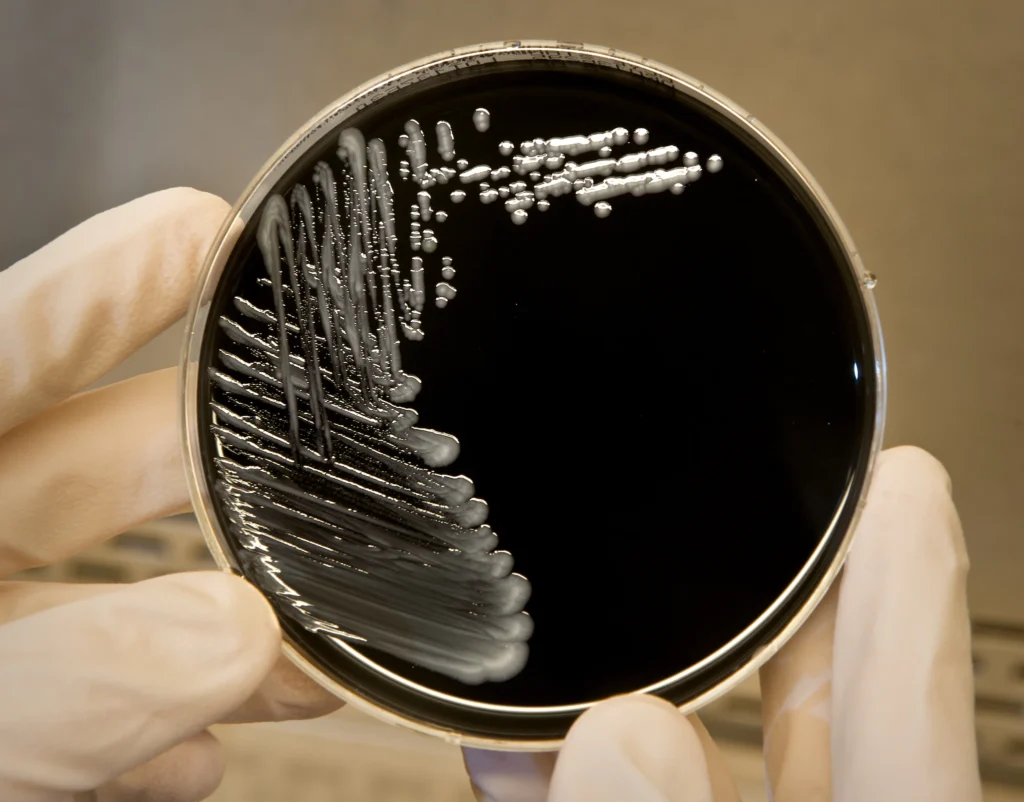
“Important Health Information for Your Upcoming Stay”
During the COVID-19 pandemic, it was common to receive an email from a hotel with health-related information or local COVID regulations. Shortly after booking my stay at the Renaissance Newark Airport, I received an email with the subject line, “Please Read for Important Health Information for your Upcoming Stay.” Initially, when I read the subject line, I assumed it was an automated email related to the COVID-19 pandemic that had not been turned off and was still being sent to guests.
Once on the shuttle to the hotel, I decided to open the email. To my surprise, the information was not related to COVID-19 but to another respiratory illness; Legionnaires’ Disease.
Below, you will find the full text of the email that I received from the Renaissance Newark Airport’s general manager:
Dear Hotel Guest,
We are delighted you have chosen to stay with us and would like to wish you a warm welcome to the Renaissance Newark Airport Hotel.
As our highest priority is always the safety and well-being of our guests, we want to inform you of a remediation process currently underway at the hotel in cooperation with the New Jersey Department of Health (“NJDOH”) and the City of Elizabeth Department of Health and Human Services (“EDOH”).
Recently, in cooperation with the NJDOH and the EDOH, the hotel collected and tested a variety of water samples from throughout the hotel’s water systems. The testing revealed Legionella bacteria present in some of the water samples collected.
The hotel undertook these tests in response to reports of two guests that contracted disease, a serious type of pneumonia, after travel to the Renaissance Newark Airport Hotel during the past year. It is unknown whether the hotel is the source of bacteria that caused these people to become sick.
The hotel is working with the NJDOH and EDOH to chemically treat the water and swiftly implement a plan to permanently disinfect the hotel’s water system to kill any remaining Legionella and prevent more from growing.
The risk of developing Legionnaires’ disease from a building’s water supply is low, especially for healthy people. However, your individual risk for Legionnaires’ disease may increase if you are 50 years or older (especially if you smoke), have chronic lung disease, have a weakened immune system, or take medications that weaken your immune system. If you have one of these health issues, take these extra steps during your stay as precautions
Do not take a shower, even a cool shower – since it could create water droplets in the air. Instead, take a bath, but fill the tub slowly. Try to minimize your time in the bathroom while the tub is filling
It is fine to brush your teeth, wash your hands or wash dishes, but fill the sink slowly to avoid splashing and producing water droplets in the air
It is fine to drink cold water from the tap but start with cold water when heating water for tea, coffee, or cooking. You cannot get Legionnaires’ disease by drinking water
If you have swallowing difficulties (i.e., water often goes down the “wrong pipe”), consider using bottled drinking water for drinking.
Never use tap water in any respiratory therapy equipment (e.g., CPAP, BiPAP) or humidifiers.
People can get Legionnaires’ disease by breathing in aerosolized water (small water droplets in the air) containing Legionella bacteria. Legionnaires’ disease cannot be spread from person-to-person. Symptoms of Legionnaires’ disease can include fever, cough, shortness of breath, muscle aches, and headaches. Symptoms occur within 14 days after being exposed to Legionella bacteria.
If you or any person who visited the hotel with you begins to develop symptoms of Legionnaires’ disease within 14 days (two weeks) after your stay at Renaissance Newark Airport Hotel, please seek medical attention right away. Bring this letter with you to show to the doctor. Legionnaires’ disease is treatable with an appropriate antibiotic.
Should you have questions at all, we welcome you to contact a hotel representative via email at [redacted] or via phone at [redacted]. If you have questions about this public health investigation, you may also wish to contact the City of Elizabeth Department of Health and Human Services directly, Monday through Friday 8:30am-4:30pm at 908-820-4124. Be sure to include your name and contact information. Additional information about Legionnaires’ disease can be found on the NJDOH’s website at: https://www.cdc.gov/legionella/index.html.
Thank you for your loyalty.
It’s certainly not an email you want to receive just minutes away from your hotel. However, I didn’t give it much thought.
As I walked into the hotel, there was a large posterboard on display with the same information warning guests about Legionnaires’ Disease. Seeing this warning in the lobby, I started to become concerned.
During check-in, the agent at the front desk informed me once again of the presence of the Legionnaires’ disease-causing bacteria in the hotel’s water supply and gestured to a piece of paper with the email I had received earlier in the day.
I asked the agent, “So, when did the hotel’s water last test positive for the bacteria?” He informed me that the water tested positive for the bacteria as recently as January. I then asked, “Well, what if I don’t want to stay here?” He explained that he could cancel my reservation and refund me my points.
Not having an alternative hotel confirmed, I decided to continue with check-in and hoped that the hotel was just being overly cautious.
Chlorine Tablets and a Bathroom Undergoing Repairs
I made my way to my room on the 10th floor. Upon opening the door to my room, I noticed what looked like little pill packets sitting on the cabinet housing the mini-fridge along with the same letter that had been sent to me in an email.
The small packets had been opened and left on the cabinet. I took a closer look at the packets. The text on the packets read “Vario F10 Chlorine.”
After a little research, I learned that these tablets are used to test chlorine concentration in water. This leads me to believe that the property is still actively battling the presence of Legionella bacteria in its water supply and is using high concentrations of chlorine to rid the supply of the bacteria.
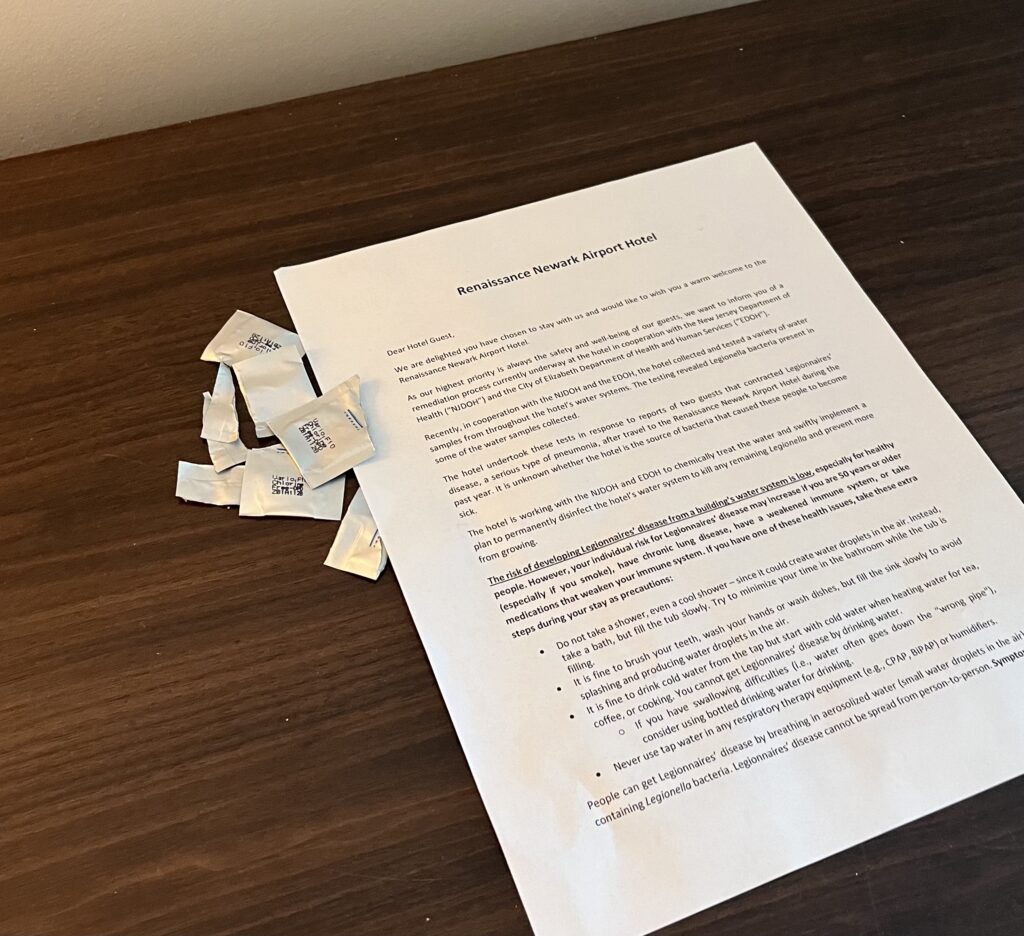
After taking a closer look at the tablets, I turned around and noticed some anomalies in the bathroom. In the bathroom, the fixtures in the shower had been completely removed. There were towels strung across the bathroom floor with tools sitting on the toilet tank.
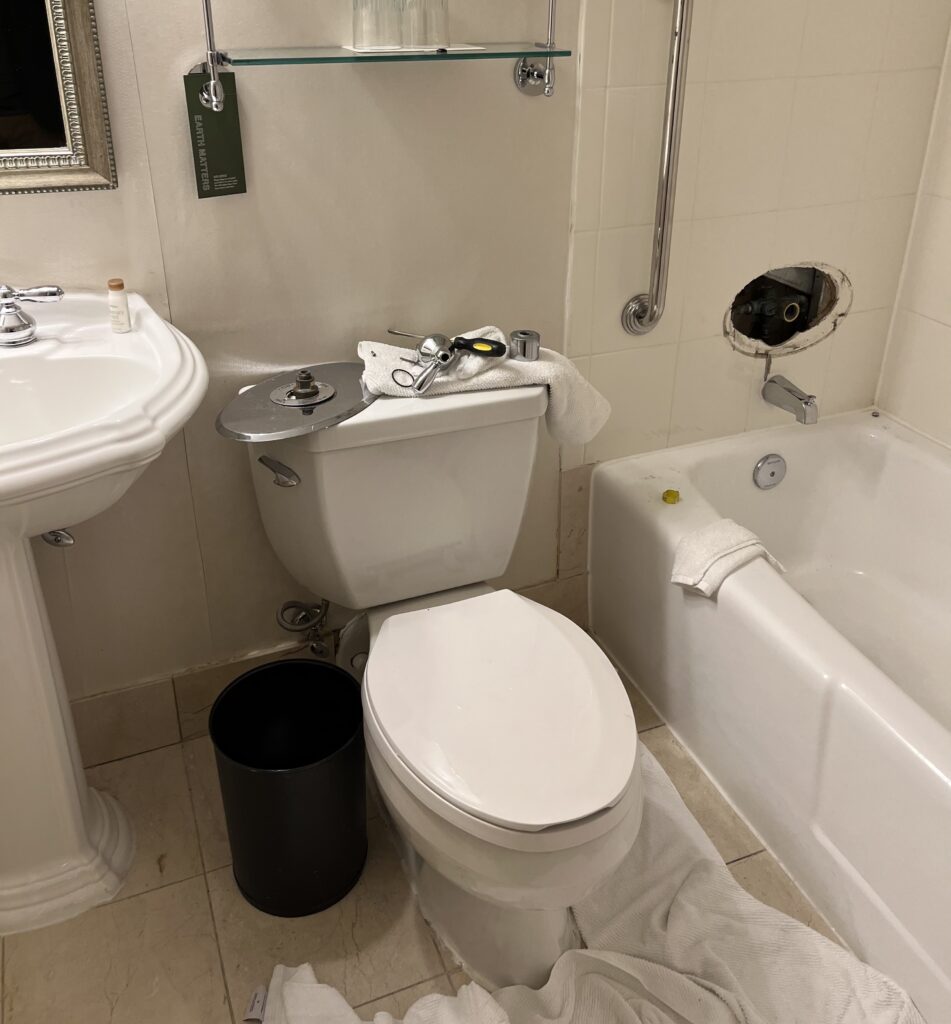
Having received a room that should not have been assigned to a guest, I made my way back down to the lobby to inform the front desk of the status of this room. They were apologetic and informed me that the room should have been taken out of service. They provided me with another room on the 10th floor just 10 rooms down from the problem room.
Should I Stay or Should I Go?
At this point, I was feeling somewhat uneasy. I initially assumed the hotel was being overly cautious. After my experience at the front desk and in my original room, I realized that there was still a high likelihood that the property was still combatting its Legionella problem.
I decided to call the Bonvoy customer assistance line to see what could be done to remedy my experience. I was quickly connected to a representative. I explained to the customer service representative the predicament I was in and told her that I was hoping to move to another Marriott property nearby.
The representative did not seem overly concerned but informed me that she would see what was available.
A few moments later, she began listing off some nearby hotels. I told her that the Marriott Newark Airport would work. To my surprise, she responded saying, “Okay, well, that will cost a few more points, 32,000 points to be exact.”
She continued listing off properties and the corresponding nightly award rates. At this point, I was becoming somewhat upset and could sense that this call was not going anywhere. So, I decided to finish up the phone call.
I was not going to pay more to move to another property and was surprised that this was even provided as a way to remedy the issue.
Tired and not wanting to deal with this problem any longer, I made my final decision. I would stay at the Renaissance Newark Airport but, unfortunately, not take a shower or use the water.
I have not followed up with Marriott since my stay. Given the initial response from the customer service representative and the nonchalance of the front desk, I assume any complaint would not yield the results I am looking for and just add insult to injury.
I am curious as to what others would have done or if readers have experienced similar issues involving the presence of Legionella in a hotel’s water supply. Would you have stayed at the hotel and if so, would you have used the shower? If not, would you expect any compensation or service recovery options?




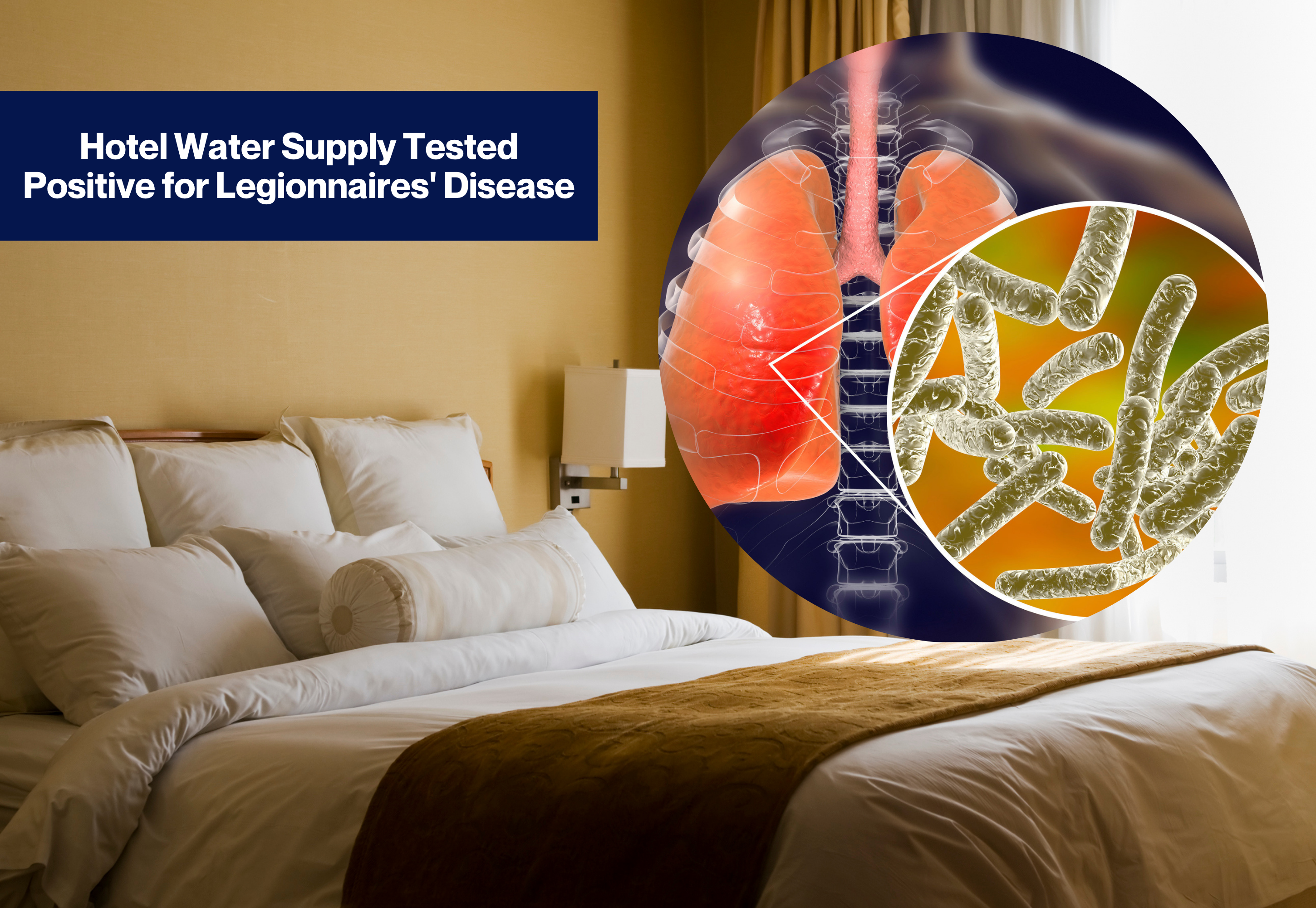
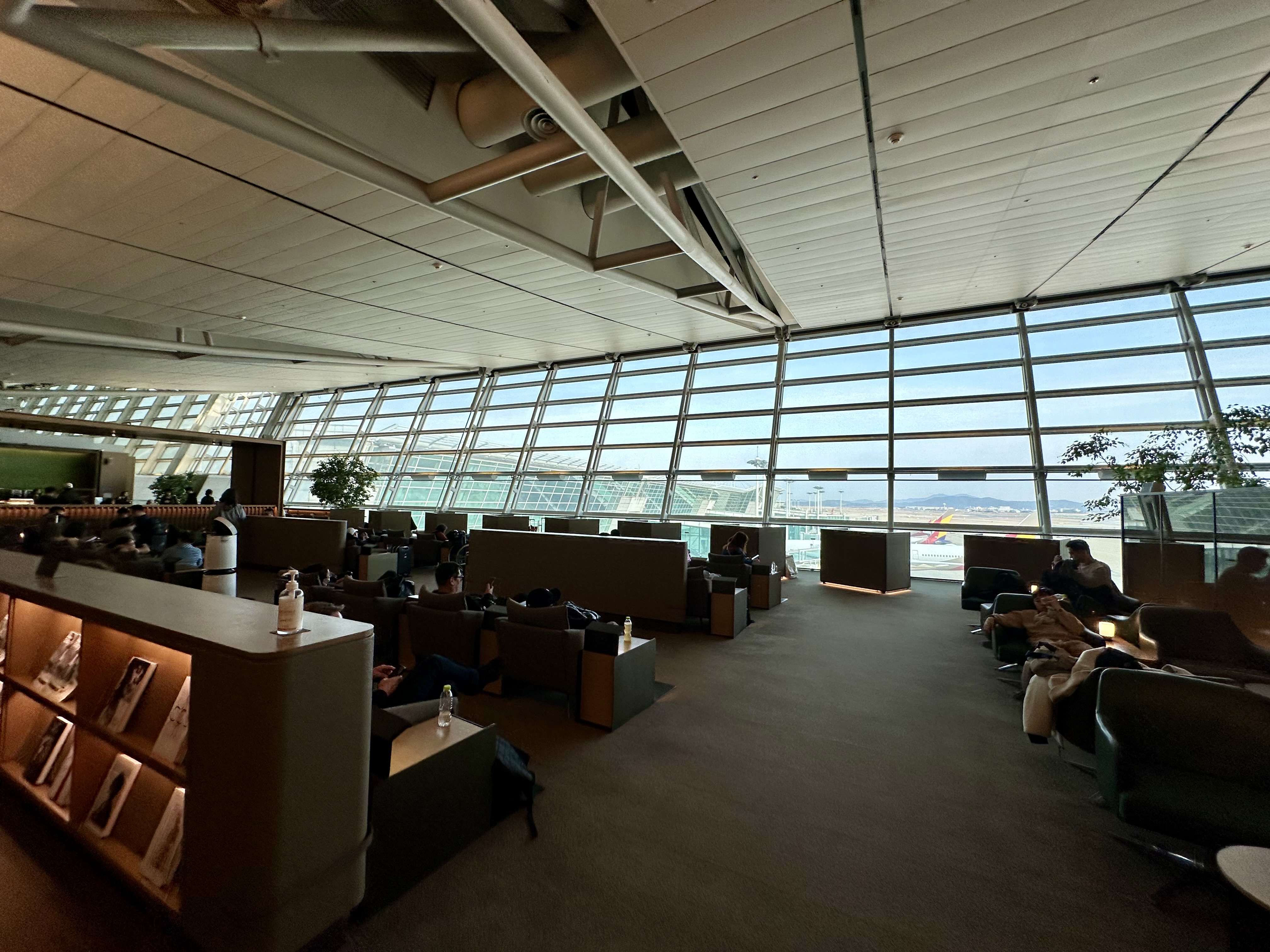


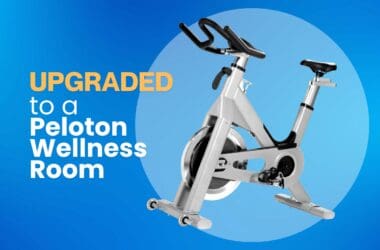
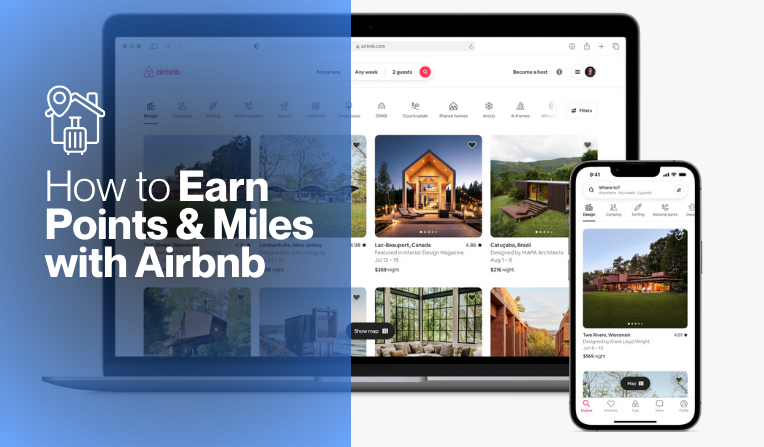



I am staying there in late October are a flight back from Greece. Hopefully all will be resolved by then.
Wow. Just wow. Incredibly amusing and frightening at the same time. I’m trying to figure whether you got Bonvoyed on this one.